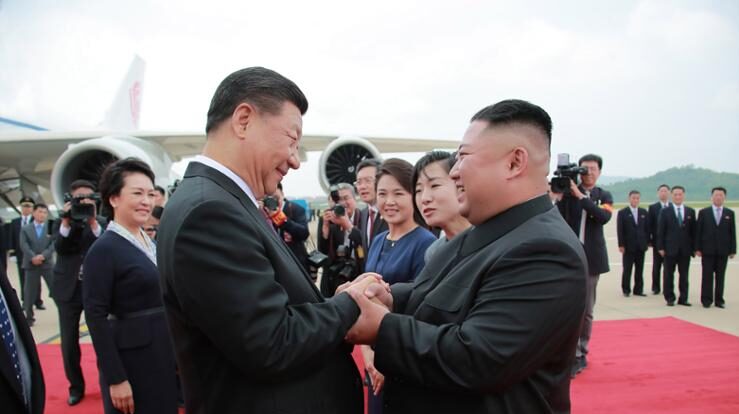WEB DESK: Relations between North Korea and its primary patron, China, appear to be fraying, observers said Wednesday, suggesting that their ties have grown increasingly distant as Pyongyang has found a new ally — Russia.
In January, Chinese President Xi Jinping and North Korean leader Kim Jong-un jointly announced 2024 as the China-North Korea Friendship Year, marking the 75th anniversary of their diplomatic relations. They said various activities will take place to celebrate this milestone.
But so far, there have been few signs of festivities or high-level exchanges.
The latest known high-ranking Chinese official to visit North Korea was Beijing’s top legislator, Zhao Leji, who traveled to Pyongyang in April.
“The visit by Zhao, China’s No. 3 ranking official, cannot be viewed as the most significant exchange for the 75th anniversary. Yet we are still not seeing any signs of Xi Jinping’s visit to Pyongyang materializing,” Park Won-gon, professor of North Korean studies at Ewha Womans University, told The Korea Times.
Park noted that signs of cracks in their relationship have become increasingly visible in recent months.
Recently, Beijing reportedly demanded that Pyongyang recall all of its laborers — estimated to be tens of thousands — currently working across China. While North Korea wanted a gradual repatriation of these workers, China has insisted that all workers whose visas have expired must be sent back en masse, according to reports.
United Nations Security Council (UNSC) Resolution 2397, passed in 2017, mandated member states to complete the repatriation of North Korean workers abroad by the end of 2019. To comply with these sanctions, Beijing initially set a deadline of 2019 for all North Korean workers to return home, but this was hindered by Pyongyang’s stringent COVID-19 border lockdowns.
“Once these workers return home, North Korea would want to send new workers to China. But it is uncertain whether Beijing would openly accept these new laborers, which would violate the U.N. sanctions,” Park said, adding that China’s handling of the North Korean laborer issue could be a litmus test of the friendship between the two nations.
South Korea’s foreign ministry and intelligence agency said they are closely monitoring the recent developments, while the Chinese government refuted the claims as baseless.
“China and the DPRK are close neighbors, connected by mountains and rivers. The two countries have maintained a traditional friendship and cooperative ties,” Chinese foreign ministry spokesperson Lin Jian said during a recent press briefing, Tuesday. DPRK stands for the Democratic People’s Republic of Korea, North Korea’s official name.
Since June 20, North Korean state-run broadcasters, including Korean Central Television, switched to a Russian satellite for overseas broadcasts after years of using a Chinese one. This move was seen as another sign of Beijing’s diminishing influence over Pyongyang.
Yang Moo-jin, president of the University of North Korean Studies, suggested that currently, China and North Korea do not appear to prioritize each other in their diplomatic relations.
“I wouldn’t say that the traditional friendship between the two nations has diminished, but for now, China’s top priority is not North Korea. In particular, amid the growing military ties between Pyongyang and Moscow, it has become apparent that China is distancing itself from being included in the North Korea-China-Russia axis,” Yang said.
During a summit with Russian President Vladimir Putin in September 2023, the North Korean leader emphasized that relations with Moscow are “the very first priority” for his country. In a subsequent summit in June, Kim hailed Russia as “invincible comrades-in-arms.”
However, Yang noted that Beijing and Pyongyang are unlikely to allow their relations to deteriorate to a level that fundamentally undermines their bilateral alliance.
“The South Korean government may believe that China would align more closely with South Korea now that it is distancing itself from North Korea. But this is wishful thinking. The traditional alliance between Beijing and Pyongyang cannot be underestimated,” the expert said.


